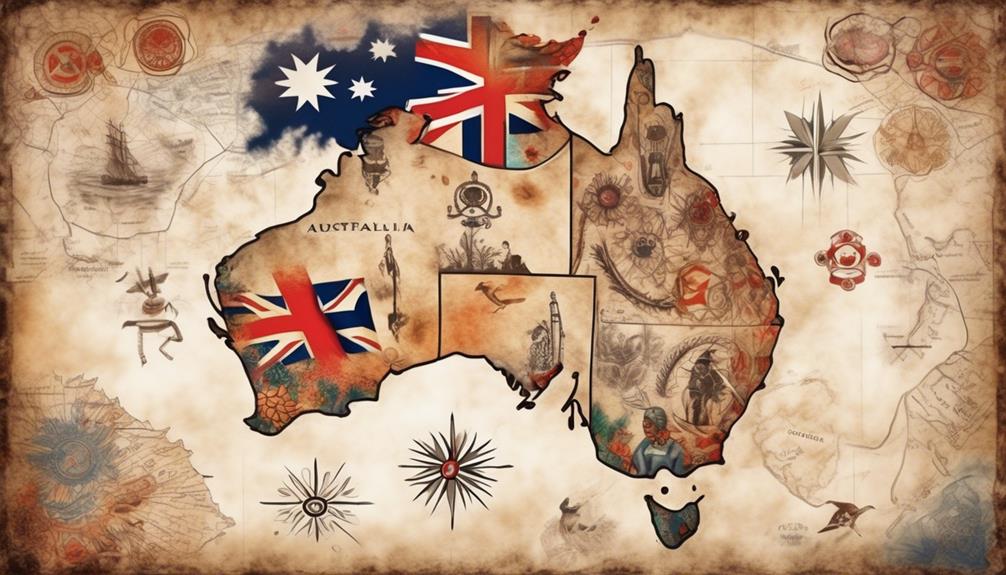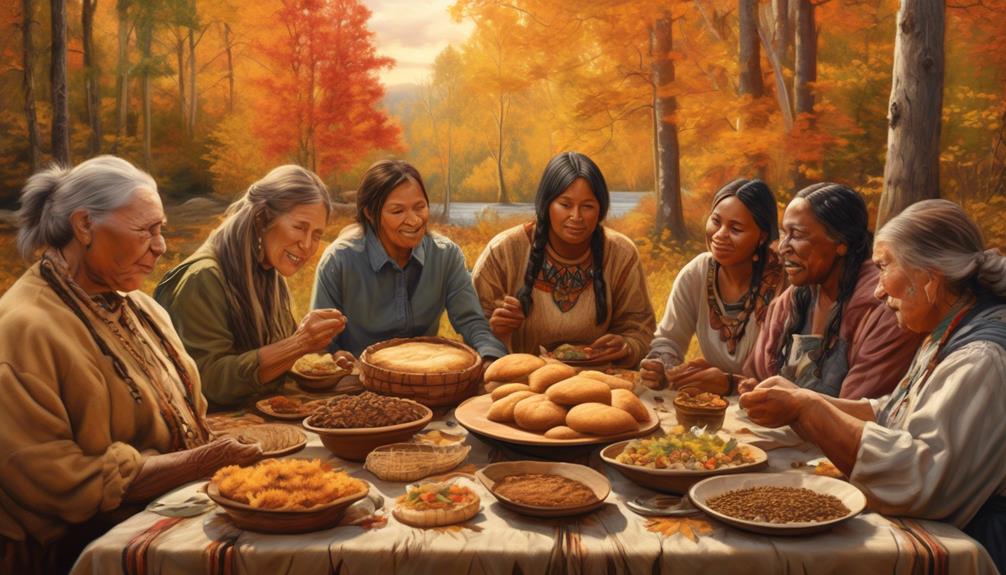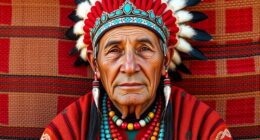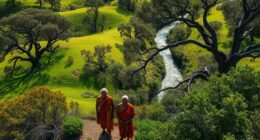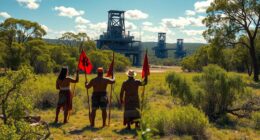The effects of British colonization on the native peoples of Australia tell a poignant and intricate story of perseverance and hardship.
On one hand, the arrival of the British brought about significant changes in the lives of the indigenous communities.
However, the repercussions of these changes continue to reverberate through the present day, shaping the contemporary experiences of indigenous Australians.
While some may be familiar with the broad strokes of this historical narrative, it is crucial to explore the nuanced ways in which the British takeover deeply affected the indigenous peoples of Australia.
Key Takeaways
- Forced displacement and removal of Indigenous communities from their homelands had a devastating impact on their connection to cultural heritage and traditional way of life.
- The violent conflict resulted in the decimation of entire family groups, disruption of traditional societal structures, and loss of cultural knowledge and practices.
- The introduction of new diseases without immunity among Indigenous populations led to widespread mortality, lack of proper healthcare, and increased susceptibility to health complications.
- The British takeover involved systematic suppression and erasure of indigenous cultural traditions and languages, separation of indigenous children from families, and the endangerment and extinction of indigenous languages and cultural traditions.
Forced Displacement From Ancestral Lands
Forced displacement from ancestral lands has had a devastating impact on the Indigenous peoples of Australia, stripping them of their connection to their cultural heritage and disrupting their traditional way of life. The process of colonial assimilation led to the systematic removal of Indigenous communities from their homelands, resulting in profound cultural erosion. This displacement severed the deep-rooted connection that Indigenous peoples had with their land, which is intrinsic to their identity and spirituality. The forced relocation not only caused immense trauma but also disrupted their intricate social and kinship structures, leading to widespread dislocation and loss of traditional knowledge.
The consequences of this displacement are far-reaching, with enduring effects on Indigenous communities. The severance from ancestral lands has resulted in a loss of traditional practices, languages, and customs, further exacerbating the erosion of cultural identity. The displacement also led to the disintegration of communal ties and the breakdown of intergenerational transmission of cultural knowledge. As a result, Indigenous peoples continue to grapple with the profound repercussions of being uprooted from their ancestral lands, underscoring the enduring legacy of colonial oppression.
Violent Conflict and Loss of Life
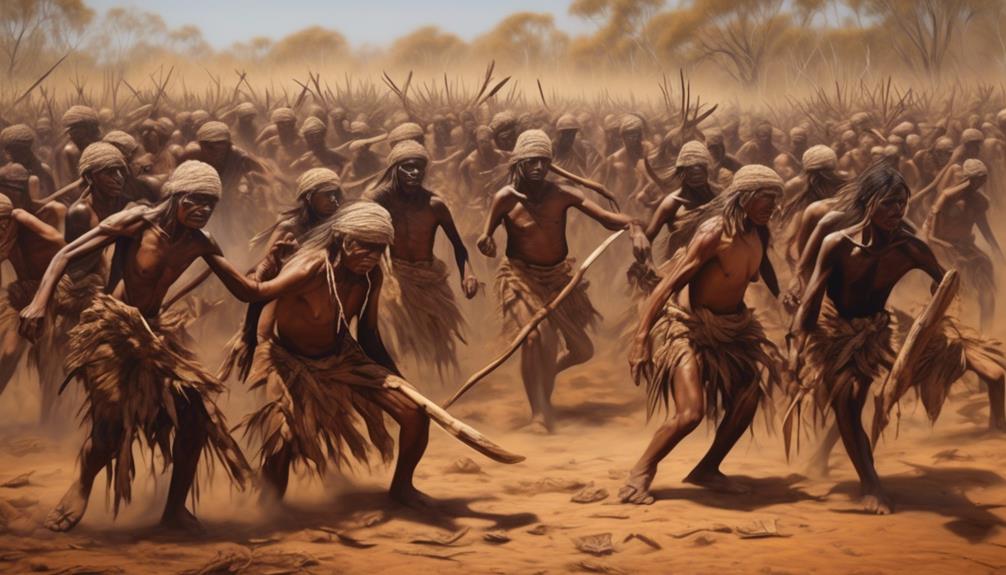
Amid the colonial takeover, violent conflicts and loss of life inflicted immeasurable suffering on the Indigenous peoples of Australia, leaving a lasting legacy of trauma and devastation. The impact on the community was profound, as entire family groups were decimated, and traditional societal structures were disrupted. This led to a loss of cultural knowledge and practices, further exacerbating the trauma experienced by the Indigenous peoples. The violence perpetrated against them not only resulted in the loss of countless lives but also had long-term implications for the social and emotional wellbeing of the community.
In the face of such adversity, resistance movements emerged as a testament to the strength and resilience of the Indigenous peoples. Despite the overwhelming force they were up against, they fiercely defended their lands and their way of life. The resistance, however, often led to even more violent reprisals from the colonizers, perpetuating a cycle of conflict and suffering.
The legacy of violent conflict and loss of life continues to reverberate through Indigenous communities, shaping their experiences and perspectives. It's crucial to acknowledge this history and its ongoing impact on the Indigenous peoples of Australia.
Spread of Diseases and Health Impacts
The introduction of new diseases had a profound impact on the health and well-being of the Indigenous peoples of Australia, leading to devastating consequences for their communities. The impact of diseases brought by the British takeover was catastrophic, with indigenous populations having little to no immunity to these new illnesses. This resulted in widespread mortality, decimating entire communities and disrupting social structures.
The diseases, such as smallpox and influenza, spread rapidly through the Indigenous communities, causing widespread illness and death. Families and communities were torn apart as the diseases ravaged through their populations, leaving behind a trail of devastation and loss.
The lack of proper healthcare and medical resources meant that many Indigenous individuals suffered immensely without proper treatment, deepening the impact of the diseases on their overall well-being.
The healthcare disparities further exacerbated the situation, as the Indigenous peoples lacked access to adequate medical care and resources to combat these diseases effectively. This led to prolonged suffering and increased susceptibility to further health complications.
The profound effects of these diseases on the Indigenous peoples' health and communities continue to resonate through generations, highlighting the long-lasting consequences of the British takeover on their well-being.
Suppression of Cultural Traditions and Language
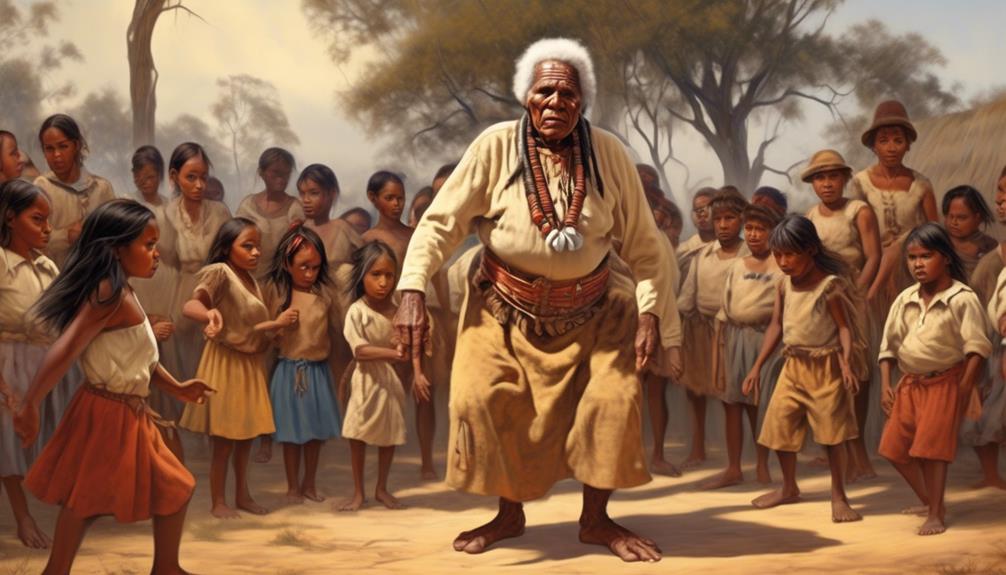
Suppressed by colonial policies and forced assimilation, the indigenous cultural traditions and languages of Australia faced systematic erasure and repression under British rule. The British authorities implemented policies aimed at cultural assimilation, seeking to erase the rich cultural heritage of the indigenous peoples. These policies included separating indigenous children from their families and communities to be educated in institutions that forbade them from speaking their native languages or practicing their cultural traditions.
This deliberate suppression had a profound impact, leading to the loss of traditional knowledge and practices that had been passed down through generations. As a result, many indigenous languages and cultural traditions are now critically endangered, with some on the brink of extinction.
Efforts are being made to preserve and revitalize indigenous languages and cultural practices, recognizing their intrinsic value and the importance of cultural diversity. Supporting initiatives for language preservation and cultural revitalization is crucial in acknowledging and rectifying the historical injustices imposed upon the indigenous peoples of Australia.
Ongoing Struggles for Rights and Land Reclamation
Ongoing efforts to secure rights and reclaim ancestral lands continue to be central to the Indigenous peoples' struggle for justice and self-determination in Australia.
- Land Ownership: Indigenous communities are engaged in protracted legal battles to regain ownership of their traditional lands, which were often taken without consent or adequate compensation during the colonial period. These lands hold immense cultural and spiritual significance, and the fight for their return is deeply intertwined with the preservation of Indigenous identity and heritage.
- Political Representation: Despite some progress, Indigenous peoples in Australia continue to face significant barriers to political representation. Efforts to increase the presence of Indigenous voices in decision-making processes and ensure their meaningful participation in shaping policies that affect their communities are ongoing. The push for greater political representation is seen as crucial in addressing the systemic injustices faced by Indigenous peoples and in advancing their rights within the broader Australian society.
- Challenges and Resilience: The journey towards land reclamation and political empowerment is fraught with challenges, including bureaucratic hurdles and resistance from vested interests. Nonetheless, Indigenous communities persist in their quest for justice, drawing strength from their rich cultural heritage and the resilience of their ancestors.
Frequently Asked Questions
How Did the British Takeover Impact the Spiritual and Religious Beliefs of the Indigenous Peoples of Australia?
The British takeover profoundly impacted the spiritual and religious beliefs of the Indigenous peoples of Australia. Cultural assimilation efforts led to a loss of connection to sacred lands and traditions.
Despite this, Indigenous communities showed remarkable resilience through resistance movements, preserving their spiritual practices and beliefs.
The impact on spirituality was devastating, but the enduring strength and resilience of Indigenous cultures are a testament to the richness of their traditions.
What Long-Term Environmental Impacts Did the Forced Displacement From Ancestral Lands Have on the Indigenous Communities?
Forced displacement from ancestral lands caused long-term environmental degradation and cultural preservation challenges for Indigenous communities.
The loss of connection to our traditional territories resulted in the degradation of natural resources and ecosystems.
The struggle to maintain cultural practices in unfamiliar environments also intensified.
Consequently, this upheaval continues to impact our communities, highlighting the intricate link between environmental and cultural preservation.
How Did the Spread of Diseases Brought by the British Settlers Affect the Traditional Healing Practices of the Indigenous Peoples?
The impact of diseases on the traditional healing practices of the indigenous peoples was devastating. Diseases brought by the British settlers disrupted our traditional knowledge and healing methods, leading to a loss of valuable cultural practices.
This significantly affected our ability to manage the land and maintain the balance between our communities and the environment. The spread of diseases not only caused physical suffering but also eroded our cultural heritage and connection to the land.
What Role Did the British Takeover Play in the Loss of Traditional Knowledge and Practices Related to Land Management and Conservation?
We see the British takeover as a force like a relentless tide, eroding the traditional knowledge and practices of land management and conservation held by the Indigenous peoples of Australia.
The imposition of British laws, policies, and attitudes disrupted age-old practices, leading to the loss of vital knowledge crucial for sustainable land stewardship.
This historic upheaval significantly impacted the Indigenous communities' ability to maintain their ancestral connection to the land and preserve its ecological balance.
How Have the Ongoing Struggles for Rights and Land Reclamation Affected the Mental Health and Well-Being of the Indigenous Peoples of Australia?
The ongoing struggles for rights and land reclamation have had profound impacts on the mental health and well-being of the Indigenous peoples of Australia.
The effects on mental health are significant and enduring, stemming from historical trauma and ongoing injustices.
Land reclamation efforts, while vital for cultural and spiritual revitalization, also bring emotional labor and stress.
These factors compound existing mental health challenges, highlighting the urgent need for support and healing initiatives.
Conclusion
In conclusion, the British takeover of Australia had profound and lasting impacts on the indigenous peoples.
Like a relentless storm, it forced displacement, caused violent conflict, and spread diseases that continue to affect their health.
It suppressed cultural traditions and language like a heavy fog, and the ongoing struggle for rights and land reclamation continues to be a challenging uphill battle.
The legacy of this historical injustice weighs heavily on the hearts and minds of the indigenous peoples.
